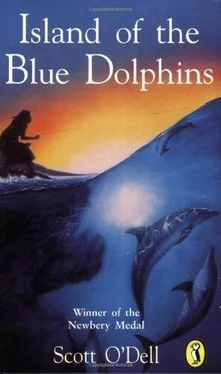PUFFIN BOOKS
Island of the Blue Dolphins
Scott O'Dell was born in Los Angeles and lived with his wife at Stoneapple Farm, Julian, an 1870 gold-mining town in the mountains east of San Diego. Though his great-grandfather was a first cousin of Sir Walter Scott, Scott O'Dell's literary reputation is based solely on the success of his own books. He was a newspaperman and an authority on California history. He won many awards for his writing throughout the world, including the Newbery Award for Children's Literature for Island of the Blue Dolphins . Scott O'Dell was was the author of Country of the Sun , an informal history of Southern California, and Hill of the Hawk , which is considered the best historical novel of the region. He died in October 1989.
I remember the day the Aleut ship came to our island. At first it seemed like a small shell afloat on the sea. Then it grew larger and was a gull with folded wings. At last in the rising sun it became what it really was — a red ship with two red sails.
My brother and I had gone to the head of a canyon that winds down to a little harbour which is called Coral Cove. We had gone to gather roots that grow there in the spring.
My brother Ramo was only a little boy half my age, which was twelve. He was small for one who had lived so many suns and moons, but quick as a cricket. Also foolish as a cricket when he was excited. For this reason and because I wanted him to help me gather roots and not go running off, I said nothing about the shell I saw or the gull with folded wings.
I went on digging in the brush with my pointed stick as though nothing at all were happening on the sea. Even when I knew for sure that the gull was a ship with two red sails.
But Ramo's eyes missed little in the world. They were black like a lizard's and very large and, like the eyes of a lizard, could sometimes look sleepy. This was the time when they saw the most. This was the way they looked now. They were half-closed, like those of a lizard lying on a rock about to flick out its tongue to catch a fly.
‘The sea is smooth,’ Ramo said. ‘It is a flat stone without any scratches.’
My brother liked to pretend that one thing was another.
‘The sea is not a stone without scratches,’ I said. ‘It is water and no waves.’
‘To me it is a blue stone,’ he said. ‘And far away on the edge of it is a small cloud which sits on the stone.’
‘Clouds do not sit on stones. On blue ones or black ones or any kind of stones.’
‘This one does.’
‘Not on the sea,’ I said. ‘Dolphins sit there, and gulls, and cormorants, and otter, and whales too, but not clouds.’
‘It is a whale, maybe.’
Ramo was standing on one foot and then the other, watching the ship coming, which he did not know was a ship because he had never seen one. I had never seen one either, but I knew how they looked because I had been told.
‘While you gaze at the sea,’ I said, ‘I dig roots. And it is I who will eat them and you who will not.’
Ramo began to punch at the earth with his stick, but as the ship came closer, its sails showing red through the morning mist, he kept watching it, acting all the time as if he were not.
‘Have you ever seen a red whale?’ he asked.
‘Yes,’ I said, though I never had.
‘Those I have seen are grey.’
‘You are very young and have not seen everything that swims in the world.’
Ramo picked up a root and was about to drop it into the basket. Suddenly his mouth opened wide and then closed again.
‘A canoe!’ he cried. ‘A great one, bigger than all of our canoes together. And red!’
A canoe or a ship, it did not matter to Ramo. In the very next breath he tossed the root in the air and was gone, crashing through the brush, shouting as he went.
I kept on gathering roots, but my hands trembled as I dug in the earth, for I was more excited than my brother. I knew that it was a ship there on the sea and not a big canoe, and that a ship could mean many things. I wanted to drop the stick and run too, but I went on digging roots because they were needed in the village.
By the time I filled the basket, the Aleut ship had sailed around the wide kelp bed that encloses our island and between the two rocks that guard Coral Cove. Word of its coming had already reached the village of Ghalas-at. Carrying their weapons, our men sped along the trail which winds down to the shore. Our women were gathering at the edge of the mesa.
I made my way through the heavy brush and, moving swiftly, down the ravine until I came to the sea cliffs. There I crouched on my hands and knees. Below me lay the cove. The tide was out and the sun shone on the white sand of the beach. Half the men from our village stood at the water's edge. The rest were concealed among the rocks at the foot of the trail, ready to attack the intruders should they prove unfriendly.
As I crouched there in the toyon bushes, trying not to fall over the cliff, trying to keep myself hidden and yet to see and hear what went on below me, a boat left the ship. Six men with long oars were rowing. Their faces were broad, and shining dark hair fell over their eyes. When they came closer I saw that they had bone ornaments thrust through their noses.
Behind them in the boat stood a tall man with a yellow beard. I had never seen a Russian before, but my father had told me about them, and I wondered, seeing the way he stood with his feet set apart and his fists on his hips and looked at the little harbour as though it already belonged to him, if he were one of those men from the north whom our people feared. I was certain of it when the boat slid in to the shore and he jumped out, shouting as he did so.
His voice echoed against the rock walls of the cove. The words were strange, unlike any I had ever heard. Slowly then he spoke in our tongue.
‘I come in peace and wish to parley,’ he said to the men on the shore.
None of them answered, but my father, who was one of those hidden among the rocks, came forward down the sloping beach. He thrust his spear into the sand.
‘I am the Chief of Ghalas-at,’ he said. ‘My name is Chief Chowig.’
I was surprised that he gave his real name to a stranger. Everyone in our tribe had two names, the real one which was secret and was seldom used, and one which was common, for if people use your secret name it becomes worn out and loses its magic. Thus I was known as Won-a-pa-lei, which means The Girl with the Long Black Hair, though my secret name is Karana. My father's secret name was Chowig. Why he gave it to a stranger I do not know.
The Russian smiled and held up his hand, calling himself Captain Orlov. My father also held up his hand. I could not see his face, but I doubted that he smiled in return.
‘I have come with forty of my men,’ said the Russian. ‘We come to hunt sea otter. We wish to camp on your island while we are hunting.’
My father said nothing. He was a tall man, though not so tall as Captain Orlov, and he stood with his bare shoulders thrown back, thinking about what the Russian had said. He was in no hurry to reply because the Aleuts had come before to hunt otter. That was long in the past, but my father still remembered them.
‘You remember another hunt,’ Captain Orlov said when my father was silent. ‘I have heard of it, too. It was led by Captain Mitriff who was a fool and is now dead. The trouble arose because you and your tribe did all of the hunting.’
‘We hunted,’ said my father, ‘but the one you call a fool wished us to hunt from one moon to the next, never ceasing.’
‘This time you will need to do nothing,’ Captain Orlov said. ‘My men will hunt and we will divide the catch. One part for you, to be paid in goods, and two parts for us.’
Читать дальше











